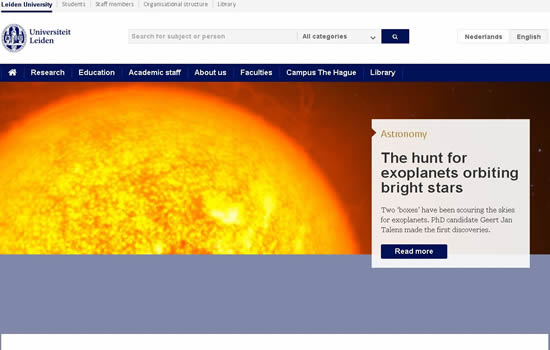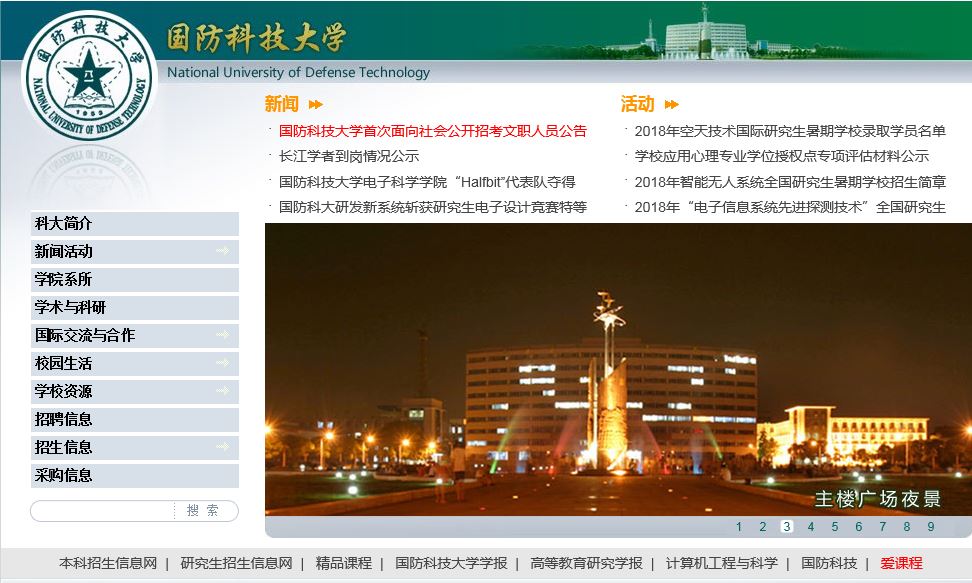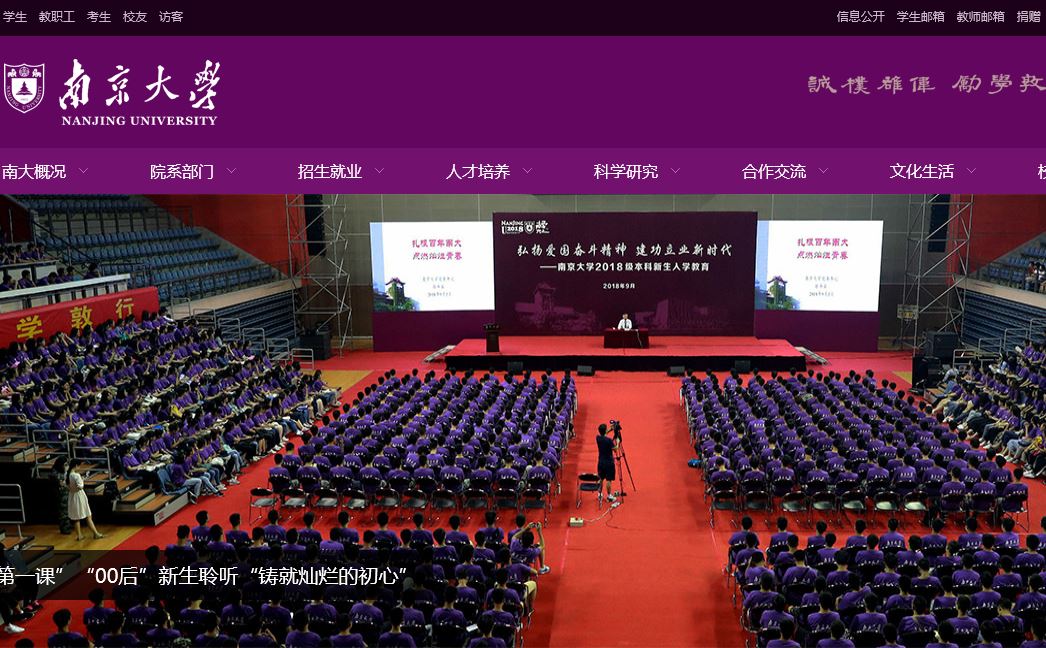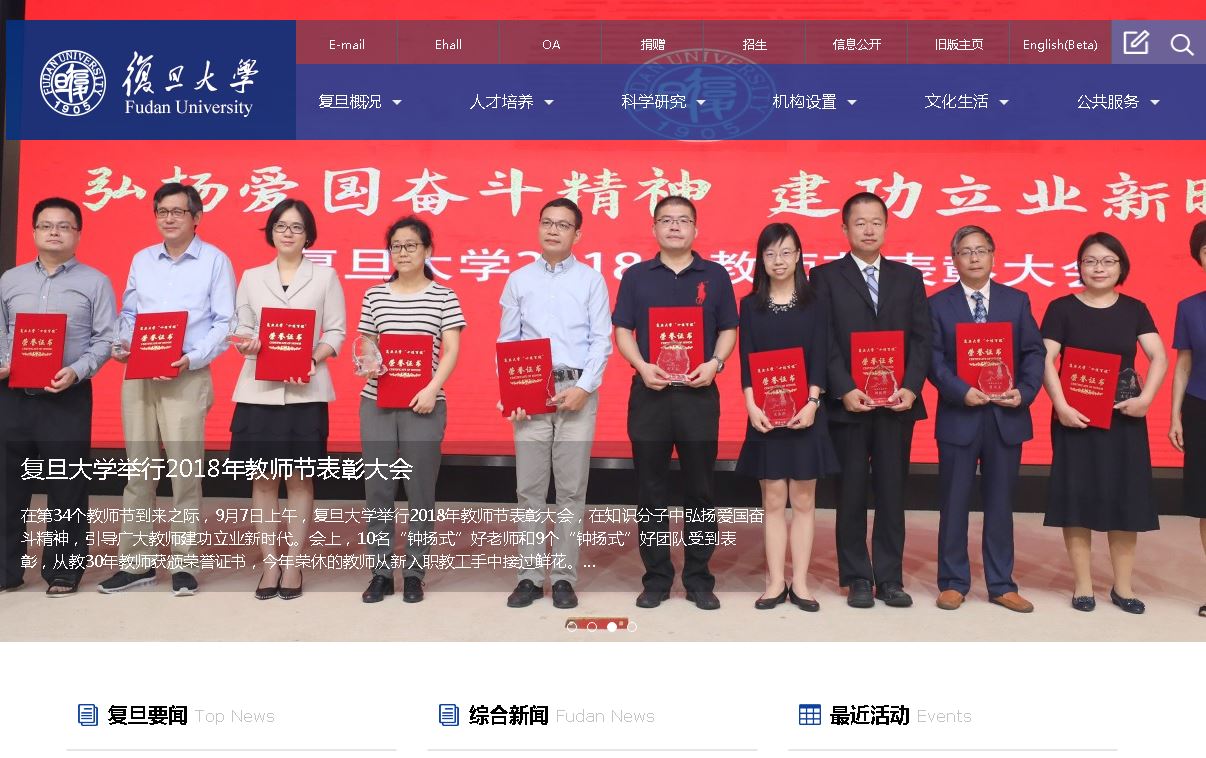选择热点
 荷兰莱顿大学
荷兰莱顿大学 西班牙巴塞罗那大学
西班牙巴塞罗那大学 巴西圣保罗大学 University of Sao Paulo, Brazil
巴西圣保罗大学 University of Sao Paulo, Brazil 台湾南华大学 University of South China in Taiwan
台湾南华大学 University of South China in Taiwan 科技大学 National University of Defense Technology
科技大学 National University of Defense Technology 南京大学 Nanjing University
南京大学 Nanjing University 上海复旦大学 Fudan University
上海复旦大学 Fudan University 泗水大学(Ubaya)
泗水大学(Ubaya) 印尼大学 universitas indonesia
印尼大学 universitas indonesia 越南某大学 Vietnam National University
越南某大学 Vietnam National University 菲律宾大学 University Of The Philippines
菲律宾大学 University Of The Philippines
中英双语散文欣赏:培根论嫉妒
发布时间:2025-01-06
来源:大学网站
There be none of the affections, which have been noted to fascinate or bewitch, but love and envy.
They both have vehement wishes; they frame themselves readily into imaginations and suggestions; and they come easily into the eye, especially upon the present of the objects; which are the points that conduce to fascination, if any such thing there be.
We see likewise, the Scripture calleth envy an evil eye; and the astrologers, call the evil influences of the stars, evil aspects; so that still there seemeth to be acknowledged, in the act of envy, an ejaculation or irradiation of the eye.
Nay, some have been so curious, as to note, that the times when the stroke or percussion of an envious eye doth most hurt, are when the party envied is beheld in glory or triumph; for that sets an edge upon envy: and besides, at such times the spirits of the person envied, do come forth most into the outward parts, and so meet the blow.
在人的各种情欲之中,没有一种可以看出是迷人或魔人的——除了恋爱与嫉妒。
这两者都有很强烈的愿望,它们很容易造出意象和观念;并且很容易进入眼中,尤其是当对象在场的时候,这些都是导致蛊惑之处——假设有蛊惑这种事的话。
类此,我们看见 圣经 中把嫉妒叫做凶眼”;而占星家把星宿底恶影响叫做恶容”;所以好象总有人承认嫉妒的行为中是有一种眼力底投射或放光似的。
不但如此,还有些人好奇之甚,竟说嫉妒底眼目其打击伤人最烈的时候是那受嫉的人正在显耀荣华,受人注视的时候;因为这种情形使嫉妒之心更为锐利也。
再者,在这种时候,那受嫉的人底精神多出现于外表上,因而他就受到那种打击了。
But leaving these curiosities (though not unworthy to be thought on, in fit place), we will handle, what persons are apt to envy others; what persons are most subject to be envied themselves; and what is the difference between public and private envy.
我们现在先不理这些奥妙之点(虽然在适当之处它们并非不值得思索的),且谈何种人最易嫉人;何种人最易受嫉;以及公妒与私妒有何分别。
A man that hath no virtue in himself, ever envieth virtue in others.
For men's minds, will either feed upon their own good, or upon others' evil; and who wanteth the one, will prey upon the other; and whoso is out of hope, to attain to another's virtue, will seek to come at even hand, by depressing another's fortune.
无德之人常嫉他人之有德。
因为人底心思若不以自己底好处为食,就要以他人底坏处为食的;并且缺乏这二者之一的人一定是要猎取其二的。
又任何人若是没有达到他人底美德的希望,他一定要设法压抑这另一人底幸福以求与之得平的。
A man that is busy, and inquisitive, is commonly envious.
For to know much of other men's matters, cannot be because all that ado may concern his own estate; therefore it must needs be, that he taketh a kind of play-pleasure, in looking upon the fortunes of others.
Neither can he, that mindeth but his own business, find much matter for envy.
For envy is a gadding passion, and walketh the streets, and doth not keep home: Non est curiosus, quin idem sitmalevolus.
多事好问之人每善嫉。
因为所以要知道如许关于他人之事的原因决不会是因为这许多劳碌是有关于自己底利害的;因此,其原由一定是因为他在观察别人底祸福上得到一种观剧式的乐趣了。
并且一个专务己业的人也不会找着许多嫉妒底缘由来的。
因为嫉妒是一种游荡的情欲,在大街上徘徊而不肯居家,所谓未有好管闲事而不心怀恶意者也”。
Men of noble birth, are noted to be envious towards new men, when they rise.
For the distance is altered, and it is like a deceit of the eye, that when others come on, they think themselves, go back.
贵族中人对新进之人当其腾达之时常露嫉妒之情。
因为两者之间的距离改变了;好象一种视觉上的错觉一样,别人往前来而自己以为自身是后退了。
Deformed persons, and eunuchs, and old men, and bastards, are envious.
For he that cannot possibly mend his own case, will do what he can, to impair another's; except these defects light upon a very brave, and heroical nature, which thinketh to make his natural wants part of his honor; in that it should be said, that an eunuch, or a lame man, did such great matters; affecting the honorof a miracle; as it was in Narses the eunuch, and Agesilaus and Tamberlanes, that were lame men.
残疾之人、宦官、老人与私生子均善妒。
因为无法补救自己底情形的人一定要竭力损坏别人底情形的,除非这些缺陷落在一种甚为勇敢和伟大的天性上,那种天性是要以他底天生的缺陷为其荣耀之一部的;他们要人家说一个宦官或一个跛子竟作了这样的大事;这种事情底荣耀直有如一件奇迹底荣耀了;例如宦官拿尔西斯和跛人阿盖西劳斯及帖木儿是也。
The same is the case of men, that rise after calamities and misfortunes.
For they are as men fallen out with the times; and think other men's harms, a redemption of their own sufferings.
同此,经过大祸与不幸而再起的人也富于嫉妒心,因为这些人与那些不合时宜的人一样,他们以为别人受到的损害等于自己底痛苦之赔偿也。
They that desire to excel in too many matters, out of levity and vain glory, are ever envious.
For they cannot want work; it being impossible, but many, in some one of those things, should surpass them.
Which was the character of Adrian the Emperor; that mortally envied poets, and painters, and artificers, inworks wherein he had a vein to excel.
现在且一谈那些多少受人嫉妒的人。
第一,德行高的人们,其德愈增则受人嫉妒之机会愈减。
因为他们底幸福看来是他们应得的;没有人嫉妒债务之得偿,所嫉者多是报酬过当之赏赐也。
又嫉妒总是与人我底比较俱来的;没有比较的地方就没有嫉妒;因此帝王除了受帝王底嫉妒外不受他人底嫉妒。
然而应当注意的是微末之人在初升贵显的时候最受嫉妒,到后来较能克服之:反之,有功有业的人在福祉绵延之时最受嫉妒。
因为到了那个时节虽然他们底德行仍旧,但其光辉却不如昔了;因为有新的人物起来把那些德行投入暗处了。
Lastly, near kinsfolks, and fellows in office, and those that have been bred together, are more apt to envy their equals, when they are raised.
For it dothupbraid unto them their own fortunes, and pointeth at them, and cometh oftener into their remembrance, and incurreth likewise more into the note of others; and envy ever redoubleth from speech and fame.
Cain's envy was the more vile and malignant, towards his brother Abel, because when his sacrifice was better accepted, there was no body to look on.
Thus much for those, that are apt to envy.
因为浮躁与虚荣而想在过多的事业中出人头地的人总是嫉妒心盛的。
因为在那些事业中的某项上,断不能没有多人可以胜过他们的;既如此他们就不缺乏嫉妒底缘由了。
这就是埃追安皇帝底特性;他非常妒恨诗人、画家与巧匠;在这些人底事业中皇帝本人是有点过人之才的。
Concerning those that are more or less subject to envy: First, persons of eminent virtue, when they are advanced, are less envied.
For their fortune seemeth , but due unto them; and no man envieth the payment of a debt, but rewards and liberality rather.
Again, envy is ever joined with the comparing of a man's self; and where there is no comparison, no envy; and therefore kings are not envied, but by kings.
Nevertheless it is to be noted, that unworthy persons are most envied, at their first coming in, and afterwards overcome it better; whereas contrariwise, persons of worth and merit are most envied, when their fortune continueth long.
For by that time, though their virtue be the same,yet it hath not the same lustre; for fresh men grow up that darken it.
最后,近亲、同事、与同养之人,最容易在平辈腾达的时候嫉妒他们。
因为这些腾达的人们可说是以他们底幸福显出了同辈底不良;指责了他们。
并且这些腾达的人们入同辈底记忆之中较繁,同样地,惹他们底注意也较强;而嫉妒之心是由言谈及名声而倍增的。
该隐对他兄弟亚伯的嫉妒是很卑劣,很凶恶的,因为当亚伯底供品被上帝看中的时候当场并没有人旁观。
以上就是关于最易嫉人的人的话。
Persons of noble blood, are less envied in their rising.
For it seemeth but right done to their birth.
Besides, there seemeth not much added to their fortune; and envy is as the sunbeams, that beat hotter upon a bank, or steep rising ground, than upon a flat.
And for the same reason, those that are advanced by degrees, are less envied than those that are advanced suddenly and per saltum.
贵胄在升显的时候不甚受嫉。
因为那好象是他们本着家世而应得的权利。
并且他们贵显了也不见得是在他们底幸福上添加了多少;而嫉妒心有如日光,它射在危岸或埈坂上是比射在平地上要热得多的。
为了同一的原故,那些逐渐升高的人们较之那些突然腾达,一跃而跻于贵显之列的人们是少受人嫉妒的。
Those that have joined with their honor great travels, cares, or perils, are less subject to envy.
For men think that they earn their honors hardly, and pity them sometimes; and pity ever healeth envy.
Wherefore you shall observe, that the more deep and sober sort of politic persons, in their greataess, are ever bemoaning themselves, what a life they lead; chanting a quanta patimur!
Not that they feel it so, but only to abate the edge of envy.
But this is to be understood, of business that is laid upon men, and not such, as they call unto themselves.
For nothing increaseth envy more, than an unnecessary and ambitious engrossing of business.
And nothing doth extinguish envy more, than for a great person to preserve all other inferior officers, in their full lightsand pre-eminences of their places.
For by that means, there be so many screens between him and envy.
那些把他们底荣耀与重大的劳苦、忧虑、或危险连在一处的人们是少受嫉妒的。
因为人们认为这些人底荣耀是得来不易的,并且有时还可怜他们,而怜悯永远是治疗嫉妒的。
因此你可以看到那较为深沉庄重的政界中人,在他们底崇高的地位中总是自嗟自叹,说他们度着何等不乐的生活,唱着一套我们何等受苦”的歌曲。
并不是他们感觉如此,而是要减少嫉妒心底锋铓。
但是这种嗟叹所指的要是别人给他们加上的负担才行,不可指自己招来的事业。
因为再没有比无必要而野心地专搅事业之更增人嫉妒者也。
又,一个大人物若能使所有居下位者保持所有的权利和充分的身分,那就没有比这个更能消灭嫉妒的了。
因为借着这种手段,在他与嫉妒之间可说是有了好几重障隔也。
Above all, those are most subject to envy, which carry the greatness of their fortunes, in an insolent and proud manner; being never well, but while they are showing how great they are, either by outward pomp, or by triumphing over all opposition or competition; whereas wise men will rather do sacrifice to envy, in suffering themselves sometimes of purpose to be crossed, and overborne in things that do not much concern them.
Notwithstanding, so much is true, that the carriage of greatness, in a plain and open manner (so it be without arrogancy and vain glory) doth draw less envy, than if it be in a more crafty and cunning fashion.
For in that course, a man doth but disavow fortune; and seemeth to be conscious of his own want in worth; and doth but teach others, to envy him.
最甚者,有些人用一种傲慢不恭的态度来处他们底大富贵,他们是最受嫉妒的。
这些人总要表示自己底伟大——或以外表的煊赫,或以克服一切的反对与竞争——才觉得满意;而有智之人则宁可给嫉妒贡献点什么,有时在自己不甚关切的事件中故意让人阻挠或压倒。
然而这又是真的,就是在若以一种朴素坦白的态度来处尊荣(只要是不带骄矜与虚荣),比用一种较为多诈而狡猾的态度要少受人嫉妒。
因为在后一种举止里,一个人简直是表明他不配享受那种幸福并且还好象明白自己之无价值似的;由此他竟是教导别人来嫉妒自己了。
Lastly, to conclude this part; as we said in the beginning, that the act of envy had somewhat in it of witchcraft, so there is no other cure of envy, but the cure of witchcraft; and that is, to remove the lot (as they call it) and to lay it upon another.
For which purpose, the wiser sort of great persons, bring in ever upon the stage somebody upon whom to derive the envy, that would come upon themselves; sometimes upon ministers and servants; sometimes upon colleagues and associates; and the like; and for that turn there are never wanting, some persons of violent and undertaking natures, who, so they may have power and business, will take it at any cost.
最后结束这一段的话:我们在起始既说嫉妒的行为,内中有点巫术的性质,那末要治嫉妒,除了治巫术的方法再没有别的方法;那就是除去那妖气”(人们所谓的)而使之落于别人身上。
为了这种目的,有些比较明哲多智的大人物,总要把某一个旁人,叫他登台露面,好教那本要落到自己身上的嫉妒心转到那些人身上去,有时这嫉妒落到属员或仆役身上;有时落到同事或同僚身上;诸如此类:而为了这种事情,永不会缺乏一些天性莽撞而好事的人的。
这些人只要能得到权力和职务,什么代价也肯出的。
Now, to speak of public envy.
There is yet some good in public envy, whereas in private, there is none.
For public envy, is as an ostracism, that eclipseth men, when they grow too great.
And therefore it is a bridle also to great ones, to keep them within bounds.
现在且说公妒。
在为公的嫉妒中至少还有一点好处,在私妒中则是一点好处也没有的。
因为公妒好譬一种希腊式的流刑,是在有些人变得太位高权重的时候压抑他们的。
因此,公妒对于大人物们是一种控制物,可以使他们不至超越范围。
这种公妒,拉丁语叫做invidia,今语叫做公愤”;关于这个将来在论叛乱的一篇中再说。
这是国家中的一种疾病,就象染毒一样。
因为正如毒可以传染到本来健全的部分并使之受疾一样,在国家中如果生了公愤”,这种心理将使国家最好的举措也蒙不洁,使这些举措变为恶臭。
This envy, being in the Latin word invidia, goeth in the modern language, by the name of discontentment; of which we shall speak, in handling sedition.
It is a disease, in a state, like to infection.
For as infection spreadeth upon that which is sound, and tainteth it; so when envy is gotten once into a state, it traduceth even the best actions thereof, and turneth them into an ill odor.
And therefore there is little won, by intermingling of plausible actions.
For that doth argue but a weakness, and fear of envy, which hurteth so much the more, as it is likewise usual in infections; which if you fear them, you call them upon you.
所以为政者若把得人心的举措与不得人心者相混而行之,是得不到什么益处的。
因为那种办法不过表现一种懦弱,一种对嫉妒的畏惧,这种畏惧更于国家不利。
这又如各种染毒常有的情形一样,你要是怕它们,你就不啻招致它们到你身上来了。
This public envy, seemeth to beat chiefly upon principal officers or ministers, rather than upon kings, and estates themselves.
But this is a sure rule, that if the envy upon the minister be great, when the cause of it in him is small; or if the envy be general, in a manner upon all the ministers of an estate; then the envy (though hidden) is truly upon the state itself.
And so much of public envy or discontentment, and the difference thereof from private envy, which was handled in the first place.
这种公愤好象是主要专攻那些重臣大吏而非反对帝制或共和本身似的。
但是这是一条可靠的定律,就是假如对某大臣的公愤很深而这位大臣本身致之之道很微:或者这种公愤是遍及于一国中之各大臣者;那末这种公愤(虽然隐而不显)真是与国家不利的。
以上就是关于公妒或公愤以及它与私妒底差别的话,关于私妒我们在先已说过了。
We will add this in general, touching the affection of envy; that of all other affections, it is the most importune and continual.
For of other affections, there is occasion given, but now and then; and therefore it was well said, Invidia festos dies non agit: for it is ever working upon some or other.
And it is alsonoted, that love and envy do make a man pine, which other affections do not,because they are not so continual.
It is also the vilest affection, and the most depraved; for which cause it is the proper attribute of the devil, who is called, the envious man, that soweth tares amongst the wheat by night; as it always cometh to pass, that envy worketh subtilly, and in the dark, and to the prejudice of good things, such as is the wheat.
今再关于嫉妒这种情欲普遍地添说这几句:就是在一切的情欲中,嫉妒是最强求,最持久的。
因为别的情欲底起因不过是偶而有之的;因此昔人说得好:嫉妒永不休假”,因为它老是在这人或那人心上活动的。
此外还有人注意到恋爱与嫉妒是使人消瘦的,而别的情欲则不致如此,因为它们不如爱与妒之持久。
嫉妒也是最卑劣最堕落的情欲;所以嫉妒是魔鬼底本来的特质。
魔鬼是被叫做那个在夜间在麦子中种植稗子的嫉妒者”的;因为嫉妒是以诡计并且是在暗中行事的,又常于好的事物如麦子者不利。
这永远是如此的。
【中英双语散文欣赏:培根论嫉妒 查看网站:[db:时间]】
They both have vehement wishes; they frame themselves readily into imaginations and suggestions; and they come easily into the eye, especially upon the present of the objects; which are the points that conduce to fascination, if any such thing there be.
We see likewise, the Scripture calleth envy an evil eye; and the astrologers, call the evil influences of the stars, evil aspects; so that still there seemeth to be acknowledged, in the act of envy, an ejaculation or irradiation of the eye.
Nay, some have been so curious, as to note, that the times when the stroke or percussion of an envious eye doth most hurt, are when the party envied is beheld in glory or triumph; for that sets an edge upon envy: and besides, at such times the spirits of the person envied, do come forth most into the outward parts, and so meet the blow.
在人的各种情欲之中,没有一种可以看出是迷人或魔人的——除了恋爱与嫉妒。
这两者都有很强烈的愿望,它们很容易造出意象和观念;并且很容易进入眼中,尤其是当对象在场的时候,这些都是导致蛊惑之处——假设有蛊惑这种事的话。
类此,我们看见 圣经 中把嫉妒叫做凶眼”;而占星家把星宿底恶影响叫做恶容”;所以好象总有人承认嫉妒的行为中是有一种眼力底投射或放光似的。
不但如此,还有些人好奇之甚,竟说嫉妒底眼目其打击伤人最烈的时候是那受嫉的人正在显耀荣华,受人注视的时候;因为这种情形使嫉妒之心更为锐利也。
再者,在这种时候,那受嫉的人底精神多出现于外表上,因而他就受到那种打击了。
But leaving these curiosities (though not unworthy to be thought on, in fit place), we will handle, what persons are apt to envy others; what persons are most subject to be envied themselves; and what is the difference between public and private envy.
我们现在先不理这些奥妙之点(虽然在适当之处它们并非不值得思索的),且谈何种人最易嫉人;何种人最易受嫉;以及公妒与私妒有何分别。
A man that hath no virtue in himself, ever envieth virtue in others.
For men's minds, will either feed upon their own good, or upon others' evil; and who wanteth the one, will prey upon the other; and whoso is out of hope, to attain to another's virtue, will seek to come at even hand, by depressing another's fortune.
无德之人常嫉他人之有德。
因为人底心思若不以自己底好处为食,就要以他人底坏处为食的;并且缺乏这二者之一的人一定是要猎取其二的。
又任何人若是没有达到他人底美德的希望,他一定要设法压抑这另一人底幸福以求与之得平的。
A man that is busy, and inquisitive, is commonly envious.
For to know much of other men's matters, cannot be because all that ado may concern his own estate; therefore it must needs be, that he taketh a kind of play-pleasure, in looking upon the fortunes of others.
Neither can he, that mindeth but his own business, find much matter for envy.
For envy is a gadding passion, and walketh the streets, and doth not keep home: Non est curiosus, quin idem sitmalevolus.
多事好问之人每善嫉。
因为所以要知道如许关于他人之事的原因决不会是因为这许多劳碌是有关于自己底利害的;因此,其原由一定是因为他在观察别人底祸福上得到一种观剧式的乐趣了。
并且一个专务己业的人也不会找着许多嫉妒底缘由来的。
因为嫉妒是一种游荡的情欲,在大街上徘徊而不肯居家,所谓未有好管闲事而不心怀恶意者也”。
Men of noble birth, are noted to be envious towards new men, when they rise.
For the distance is altered, and it is like a deceit of the eye, that when others come on, they think themselves, go back.
贵族中人对新进之人当其腾达之时常露嫉妒之情。
因为两者之间的距离改变了;好象一种视觉上的错觉一样,别人往前来而自己以为自身是后退了。
Deformed persons, and eunuchs, and old men, and bastards, are envious.
For he that cannot possibly mend his own case, will do what he can, to impair another's; except these defects light upon a very brave, and heroical nature, which thinketh to make his natural wants part of his honor; in that it should be said, that an eunuch, or a lame man, did such great matters; affecting the honorof a miracle; as it was in Narses the eunuch, and Agesilaus and Tamberlanes, that were lame men.
残疾之人、宦官、老人与私生子均善妒。
因为无法补救自己底情形的人一定要竭力损坏别人底情形的,除非这些缺陷落在一种甚为勇敢和伟大的天性上,那种天性是要以他底天生的缺陷为其荣耀之一部的;他们要人家说一个宦官或一个跛子竟作了这样的大事;这种事情底荣耀直有如一件奇迹底荣耀了;例如宦官拿尔西斯和跛人阿盖西劳斯及帖木儿是也。
The same is the case of men, that rise after calamities and misfortunes.
For they are as men fallen out with the times; and think other men's harms, a redemption of their own sufferings.
同此,经过大祸与不幸而再起的人也富于嫉妒心,因为这些人与那些不合时宜的人一样,他们以为别人受到的损害等于自己底痛苦之赔偿也。
They that desire to excel in too many matters, out of levity and vain glory, are ever envious.
For they cannot want work; it being impossible, but many, in some one of those things, should surpass them.
Which was the character of Adrian the Emperor; that mortally envied poets, and painters, and artificers, inworks wherein he had a vein to excel.
现在且一谈那些多少受人嫉妒的人。
第一,德行高的人们,其德愈增则受人嫉妒之机会愈减。
因为他们底幸福看来是他们应得的;没有人嫉妒债务之得偿,所嫉者多是报酬过当之赏赐也。
又嫉妒总是与人我底比较俱来的;没有比较的地方就没有嫉妒;因此帝王除了受帝王底嫉妒外不受他人底嫉妒。
然而应当注意的是微末之人在初升贵显的时候最受嫉妒,到后来较能克服之:反之,有功有业的人在福祉绵延之时最受嫉妒。
因为到了那个时节虽然他们底德行仍旧,但其光辉却不如昔了;因为有新的人物起来把那些德行投入暗处了。
Lastly, near kinsfolks, and fellows in office, and those that have been bred together, are more apt to envy their equals, when they are raised.
For it dothupbraid unto them their own fortunes, and pointeth at them, and cometh oftener into their remembrance, and incurreth likewise more into the note of others; and envy ever redoubleth from speech and fame.
Cain's envy was the more vile and malignant, towards his brother Abel, because when his sacrifice was better accepted, there was no body to look on.
Thus much for those, that are apt to envy.
因为浮躁与虚荣而想在过多的事业中出人头地的人总是嫉妒心盛的。
因为在那些事业中的某项上,断不能没有多人可以胜过他们的;既如此他们就不缺乏嫉妒底缘由了。
这就是埃追安皇帝底特性;他非常妒恨诗人、画家与巧匠;在这些人底事业中皇帝本人是有点过人之才的。
Concerning those that are more or less subject to envy: First, persons of eminent virtue, when they are advanced, are less envied.
For their fortune seemeth , but due unto them; and no man envieth the payment of a debt, but rewards and liberality rather.
Again, envy is ever joined with the comparing of a man's self; and where there is no comparison, no envy; and therefore kings are not envied, but by kings.
Nevertheless it is to be noted, that unworthy persons are most envied, at their first coming in, and afterwards overcome it better; whereas contrariwise, persons of worth and merit are most envied, when their fortune continueth long.
For by that time, though their virtue be the same,yet it hath not the same lustre; for fresh men grow up that darken it.
最后,近亲、同事、与同养之人,最容易在平辈腾达的时候嫉妒他们。
因为这些腾达的人们可说是以他们底幸福显出了同辈底不良;指责了他们。
并且这些腾达的人们入同辈底记忆之中较繁,同样地,惹他们底注意也较强;而嫉妒之心是由言谈及名声而倍增的。
该隐对他兄弟亚伯的嫉妒是很卑劣,很凶恶的,因为当亚伯底供品被上帝看中的时候当场并没有人旁观。
以上就是关于最易嫉人的人的话。
Persons of noble blood, are less envied in their rising.
For it seemeth but right done to their birth.
Besides, there seemeth not much added to their fortune; and envy is as the sunbeams, that beat hotter upon a bank, or steep rising ground, than upon a flat.
And for the same reason, those that are advanced by degrees, are less envied than those that are advanced suddenly and per saltum.
贵胄在升显的时候不甚受嫉。
因为那好象是他们本着家世而应得的权利。
并且他们贵显了也不见得是在他们底幸福上添加了多少;而嫉妒心有如日光,它射在危岸或埈坂上是比射在平地上要热得多的。
为了同一的原故,那些逐渐升高的人们较之那些突然腾达,一跃而跻于贵显之列的人们是少受人嫉妒的。
Those that have joined with their honor great travels, cares, or perils, are less subject to envy.
For men think that they earn their honors hardly, and pity them sometimes; and pity ever healeth envy.
Wherefore you shall observe, that the more deep and sober sort of politic persons, in their greataess, are ever bemoaning themselves, what a life they lead; chanting a quanta patimur!
Not that they feel it so, but only to abate the edge of envy.
But this is to be understood, of business that is laid upon men, and not such, as they call unto themselves.
For nothing increaseth envy more, than an unnecessary and ambitious engrossing of business.
And nothing doth extinguish envy more, than for a great person to preserve all other inferior officers, in their full lightsand pre-eminences of their places.
For by that means, there be so many screens between him and envy.
那些把他们底荣耀与重大的劳苦、忧虑、或危险连在一处的人们是少受嫉妒的。
因为人们认为这些人底荣耀是得来不易的,并且有时还可怜他们,而怜悯永远是治疗嫉妒的。
因此你可以看到那较为深沉庄重的政界中人,在他们底崇高的地位中总是自嗟自叹,说他们度着何等不乐的生活,唱着一套我们何等受苦”的歌曲。
并不是他们感觉如此,而是要减少嫉妒心底锋铓。
但是这种嗟叹所指的要是别人给他们加上的负担才行,不可指自己招来的事业。
因为再没有比无必要而野心地专搅事业之更增人嫉妒者也。
又,一个大人物若能使所有居下位者保持所有的权利和充分的身分,那就没有比这个更能消灭嫉妒的了。
因为借着这种手段,在他与嫉妒之间可说是有了好几重障隔也。
Above all, those are most subject to envy, which carry the greatness of their fortunes, in an insolent and proud manner; being never well, but while they are showing how great they are, either by outward pomp, or by triumphing over all opposition or competition; whereas wise men will rather do sacrifice to envy, in suffering themselves sometimes of purpose to be crossed, and overborne in things that do not much concern them.
Notwithstanding, so much is true, that the carriage of greatness, in a plain and open manner (so it be without arrogancy and vain glory) doth draw less envy, than if it be in a more crafty and cunning fashion.
For in that course, a man doth but disavow fortune; and seemeth to be conscious of his own want in worth; and doth but teach others, to envy him.
最甚者,有些人用一种傲慢不恭的态度来处他们底大富贵,他们是最受嫉妒的。
这些人总要表示自己底伟大——或以外表的煊赫,或以克服一切的反对与竞争——才觉得满意;而有智之人则宁可给嫉妒贡献点什么,有时在自己不甚关切的事件中故意让人阻挠或压倒。
然而这又是真的,就是在若以一种朴素坦白的态度来处尊荣(只要是不带骄矜与虚荣),比用一种较为多诈而狡猾的态度要少受人嫉妒。
因为在后一种举止里,一个人简直是表明他不配享受那种幸福并且还好象明白自己之无价值似的;由此他竟是教导别人来嫉妒自己了。
Lastly, to conclude this part; as we said in the beginning, that the act of envy had somewhat in it of witchcraft, so there is no other cure of envy, but the cure of witchcraft; and that is, to remove the lot (as they call it) and to lay it upon another.
For which purpose, the wiser sort of great persons, bring in ever upon the stage somebody upon whom to derive the envy, that would come upon themselves; sometimes upon ministers and servants; sometimes upon colleagues and associates; and the like; and for that turn there are never wanting, some persons of violent and undertaking natures, who, so they may have power and business, will take it at any cost.
最后结束这一段的话:我们在起始既说嫉妒的行为,内中有点巫术的性质,那末要治嫉妒,除了治巫术的方法再没有别的方法;那就是除去那妖气”(人们所谓的)而使之落于别人身上。
为了这种目的,有些比较明哲多智的大人物,总要把某一个旁人,叫他登台露面,好教那本要落到自己身上的嫉妒心转到那些人身上去,有时这嫉妒落到属员或仆役身上;有时落到同事或同僚身上;诸如此类:而为了这种事情,永不会缺乏一些天性莽撞而好事的人的。
这些人只要能得到权力和职务,什么代价也肯出的。
Now, to speak of public envy.
There is yet some good in public envy, whereas in private, there is none.
For public envy, is as an ostracism, that eclipseth men, when they grow too great.
And therefore it is a bridle also to great ones, to keep them within bounds.
现在且说公妒。
在为公的嫉妒中至少还有一点好处,在私妒中则是一点好处也没有的。
因为公妒好譬一种希腊式的流刑,是在有些人变得太位高权重的时候压抑他们的。
因此,公妒对于大人物们是一种控制物,可以使他们不至超越范围。
这种公妒,拉丁语叫做invidia,今语叫做公愤”;关于这个将来在论叛乱的一篇中再说。
这是国家中的一种疾病,就象染毒一样。
因为正如毒可以传染到本来健全的部分并使之受疾一样,在国家中如果生了公愤”,这种心理将使国家最好的举措也蒙不洁,使这些举措变为恶臭。
This envy, being in the Latin word invidia, goeth in the modern language, by the name of discontentment; of which we shall speak, in handling sedition.
It is a disease, in a state, like to infection.
For as infection spreadeth upon that which is sound, and tainteth it; so when envy is gotten once into a state, it traduceth even the best actions thereof, and turneth them into an ill odor.
And therefore there is little won, by intermingling of plausible actions.
For that doth argue but a weakness, and fear of envy, which hurteth so much the more, as it is likewise usual in infections; which if you fear them, you call them upon you.
所以为政者若把得人心的举措与不得人心者相混而行之,是得不到什么益处的。
因为那种办法不过表现一种懦弱,一种对嫉妒的畏惧,这种畏惧更于国家不利。
这又如各种染毒常有的情形一样,你要是怕它们,你就不啻招致它们到你身上来了。
This public envy, seemeth to beat chiefly upon principal officers or ministers, rather than upon kings, and estates themselves.
But this is a sure rule, that if the envy upon the minister be great, when the cause of it in him is small; or if the envy be general, in a manner upon all the ministers of an estate; then the envy (though hidden) is truly upon the state itself.
And so much of public envy or discontentment, and the difference thereof from private envy, which was handled in the first place.
这种公愤好象是主要专攻那些重臣大吏而非反对帝制或共和本身似的。
但是这是一条可靠的定律,就是假如对某大臣的公愤很深而这位大臣本身致之之道很微:或者这种公愤是遍及于一国中之各大臣者;那末这种公愤(虽然隐而不显)真是与国家不利的。
以上就是关于公妒或公愤以及它与私妒底差别的话,关于私妒我们在先已说过了。
We will add this in general, touching the affection of envy; that of all other affections, it is the most importune and continual.
For of other affections, there is occasion given, but now and then; and therefore it was well said, Invidia festos dies non agit: for it is ever working upon some or other.
And it is alsonoted, that love and envy do make a man pine, which other affections do not,because they are not so continual.
It is also the vilest affection, and the most depraved; for which cause it is the proper attribute of the devil, who is called, the envious man, that soweth tares amongst the wheat by night; as it always cometh to pass, that envy worketh subtilly, and in the dark, and to the prejudice of good things, such as is the wheat.
今再关于嫉妒这种情欲普遍地添说这几句:就是在一切的情欲中,嫉妒是最强求,最持久的。
因为别的情欲底起因不过是偶而有之的;因此昔人说得好:嫉妒永不休假”,因为它老是在这人或那人心上活动的。
此外还有人注意到恋爱与嫉妒是使人消瘦的,而别的情欲则不致如此,因为它们不如爱与妒之持久。
嫉妒也是最卑劣最堕落的情欲;所以嫉妒是魔鬼底本来的特质。
魔鬼是被叫做那个在夜间在麦子中种植稗子的嫉妒者”的;因为嫉妒是以诡计并且是在暗中行事的,又常于好的事物如麦子者不利。
这永远是如此的。
【中英双语散文欣赏:培根论嫉妒 查看网站:[db:时间]】
- 上一篇: 双语经典爱情诗歌:如果你突然之间忘记了我
- 下一篇: 中英双语圣诞诗歌: 圣尼古拉来访
相关阅读
目录列表
资讯列表
英语资讯


共0条评论
网友评论温馨提示:您的评论需要经过审核才能显示,请文明发言!